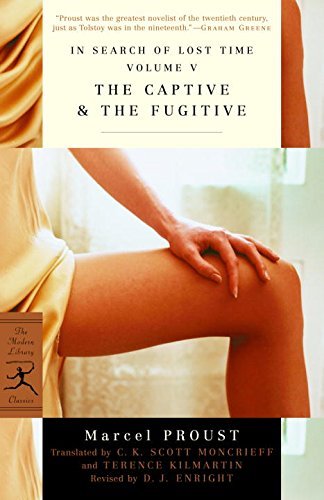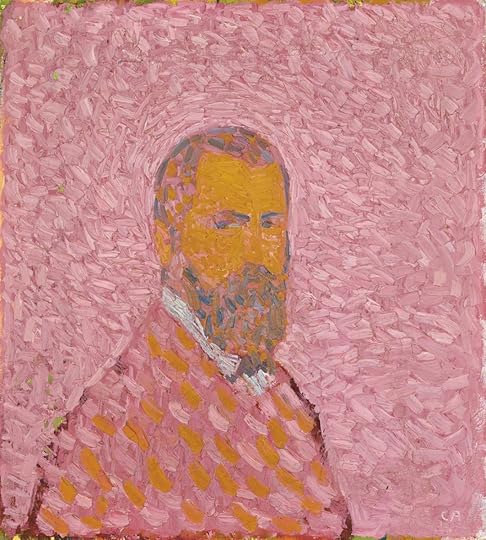What do you think?
Rate this book


992 pages, Kindle Edition
First published January 1, 1923




 come to my blog!
come to my blog!
But in exchange for what our imagination leads us to expect and we give ourselves so much futile trouble trying to find, life gives us something which we were very far from imagining.If you have come thus far in this search for time lost, here you may remember that, as unfeasible as it may seem, this is in fact but a part of a single work, one that built and built and has finally started to wind its way slowly down trains of thought already distilled, running on rails made efficient by readerly familiarity. It is not the end, not yet, but still there is the lingering sense of something other than the constant growth and spread of pure novelty of Swann, Flower, Guermantes, Sodom; rather than the youth of yore, the rites of maturation have begun. For the narrator is as gorgeously incisive as before, but in the throes of capture and flight he begins, truly begins, to consider others as being capable of the same inconsistent desire, the same instantaneous flutters of heart and habitus. Here, time begins its return.
Composers do not remember this lost fatherland, but each of them remains all his life unconsciously attuned to it; he is delirious with joy when he sings in harmony with his native land, betrays it at times with his thirst for fame, but then, in seeking fame, turns his back on it, and it is only by scorning fame that he finds it when he breaks out into that distinctive strain the sameness of which—for whatever its subject it remains identical with itself—proves the permanence of the elements that compose his soul. But in that case is it not true that those elements—all the residuum of reality which we are obliged to keep to ourselves, which cannot be transmitted in talk, even from friend to friend, from master to disciple, from lover to mistress, that ineffable something which differentiates qualitatively what each of us has felt and what he is obliged to leave behind at the threshold of the phrases in which he can communicate with others only by limiting himself to externals, common to all and of no interest—are brought out by art, the art of a Vinteuil like that of an Elstir, which exteriorises in the colours of the spectrum the intimate composition of those worlds which we call individuals and which, but for art, we should never know? A pair of wings, a different respiratory system, which enabled us to travel through space, would in no way help us, for if we visited Mars or Venus while keeping the same senses, they would clothe everything we could see in the same aspect as the things of Earth. The only true voyage, the only bath in the Fountain of Youth, would be not to visit strange lands but to possess other eyes, to see the universe through the eyes of another, of a hundred others, to see the hundred universes that each of them sees, that each of them is; and this we can do with an Elstir, with a Vinteuil; with men like these we do really fly from star to star.
It was not Albertine alone who was only a succession of moments, it was also myself [...] I was not a single man, but the march-past of a composite army manned, depending on the time of day, by passionate, indifferent or jealous men' (p.456).This revelation leads the narrator to finally recognise the extent of his subjective, contingent understandings that have been represented previously as facts:
'the egoism of love causes us to love people whose intellectual and moral features are the least objectively defined for us, we readjust them endlessly according to our desires and our fears, we cannot separate them from ourselves, they are no more than a vast and vague terrain where we externalize our affection' (p.461-2).Albertine, he realises, has been no more than a self-constructed mirror of his own desires and he is now brought to realise the solipsism of his (of all?) desire - and the book that will spring from it.
The bonds between ourselves and another person exist only in our minds. Memory as it grows fainter loosens them, and notwithstanding the illusion by which we want to be duped and with which, out of love, friendship, politeness, deference, duty, we dupe other people, we exist alone. Man is the creature who cannot escape from himself, who knows other people only in himself, and when he asserts the contrary, he is lying.
… is it not true that those elements—all the residuum of reality which we are obliged to keep to ourselves, which cannot be transmitted in talk, even from friend to friend, from master to disciple, from lover to mistress, that ineffable something which differentiates qualitatively what each of us has felt and what he is obliged to leave behind at the threshold of the phrases in which he can communicate with others only by limiting himself to externals, common to all and of no interest—are brought out by art, the art of a Vinteuil like that of an Elstir, which exteriorises in the colours of the spectrum the intimate composition of those worlds which we call individuals and which, but for art, we should never know? A pair of wings, a different respiratory system, which enabled us to travel through space, would in no way help us, for if we visited Mars or Venus while keeping the same senses, they would clothe everything we could see in the same aspect of things of Earth. The only true voyage, the only bath in the Fountain of Youth, would be not to visit strange lands but to possess other eyes, to see the universe through the eyes of another, of a hundred others, to see the hundred universes that each of them sees, that each of them is; and this we can do with an Elstir, with a Vinteuil; with men like these we really do fly from star to star.
Can one narrate time—time as such, in and of itself? Most certainly not, what a foolish undertaking that would be. The story would go: “Time passed, ran on, flowed in a mighty stream,” and on and on in the same vein. No one with any common sense could call that a narrative.
Sweet, gay, innocent moments to all appearance, and yet moments in which there gathers the unsuspected possibility of disaster, which makes the amorous life the most precarious of all, that in which the unpredictable rain of sulphur and brimstone falls after the most radiant moments, whereupon, without having the heart or the will to draw a lesson from our misfortune, we set to work at once to rebuild upon the slopes of the crater from which nothing but catastrophe can emerge. I was as carefree as those who imagine their happiness will last.Proust says elsewhere that learning that happiness cannot last is a key lesson to learn, and even claims that if Albertine had not left him he would only have known half of life.
Each new doubt makes us feel that the limit has been reached, that we cannot cope with it; then we manage to find room for it all the same, and once it is introduced into the fabric of our lives it enters into competition there with so many longings to believe, so many reasons to forget, that we speedily become accustomed to it, and end by ceasing to pay attention to it. It lies there dormant like a half-healed pain, a mere threat of suffering which, the reverse side of desire, a feeling of the same order that has become, like it, the focus of our thoughts, irradiates them from infinite distances with wisps of sadness, as desire irradiates them with unidentifiable pleasures, wherever anything can be associated with the person we love. But the pain revives as soon as a new doubt enters our mind intact; even if we assure ourselves almost at once: “I shall deal with this, there’ll be some way of avoiding suffering, it can’t be true,” nevertheless there has been a first moment in which we suffered as though we believed it. If we had merely limbs, such as legs and arms, life would be endurable. Unfortunately we carry inside us that little organ which we call the heart, which is subject to certain maladies in the course of which it is infinitely impressionable[….]Here Proust is not yet even half-way to making his point (I had to end that blockquote somewhere), but the (un)fortunate thing about Proust is that he is almost unparaphrasable, unreviewable. The only way to deal with the book might be to re-read the darn thing, over & over, without end (as a favourite professor of mine did, with both ISOLT and Ulysses on his bedside table, taking turns), taking in each partial truth partially, so that we approach but never arrive at the true heart of things….
"We love only what we do not wholly possess."I put off reviewing this book because there are so many ways to approach it--besides the many bits I underlined on the relations of art (in general, and novels in particular) to life, one other central metaphor is that jealousy is just tyrannical reason's (& its handmaiden in the above quot'n, curiosity) desire to know (& therefore to control) applied to love, for example, and by the end of the sixth volume we learn just how wrong reason can be... But I won't go into all of that--for the sake of brevity, you understand, as Polonius once said before soiling a pristine arras with stuff that "that little organ which we call the heart" traffics in…
"Here I mean by love reciprocal torture."
"Amorous curiosity is like the curiosity aroused in us by the names of places; perpetually disappointed, it revives and remains for ever insatiable."

 http://www.bbc.co.uk/programmes/b0076qrn
http://www.bbc.co.uk/programmes/b0076qrn Revisiting, via BBC R4x, all the books in remembrance, our world has altered too.
Revisiting, via BBC R4x, all the books in remembrance, our world has altered too."For my taste, Proust explains much: 300 pages just to make us understand that X screws Y is way too much."
— Louis-Ferdinand Céline. Letter for Milton Hindus.
"The closer one becomes to human beings and their existences, the more one is convinced that ready-made labels and classifications are too simple."
— Marcel Proust. The prisoner.
“It is the homosexuality that survives in spite of obstacles, condemned, covered in shame, that is the real homosexuality.”
— Marcel Proust. The prisoner.
"I think that with you she had overcome her passions and kept postponing the day when she would yield again."
— Marcel Proust. The fugitive.